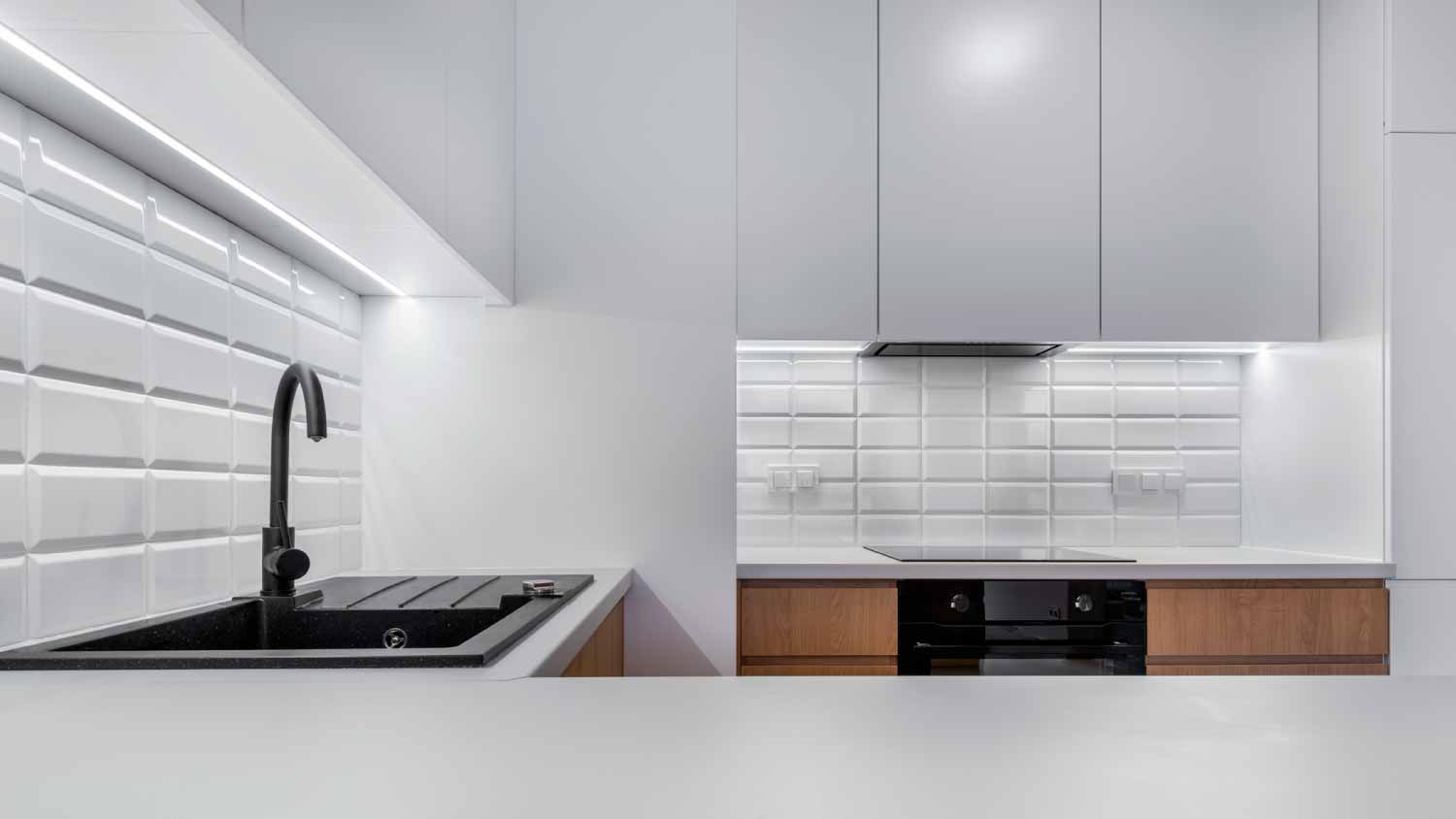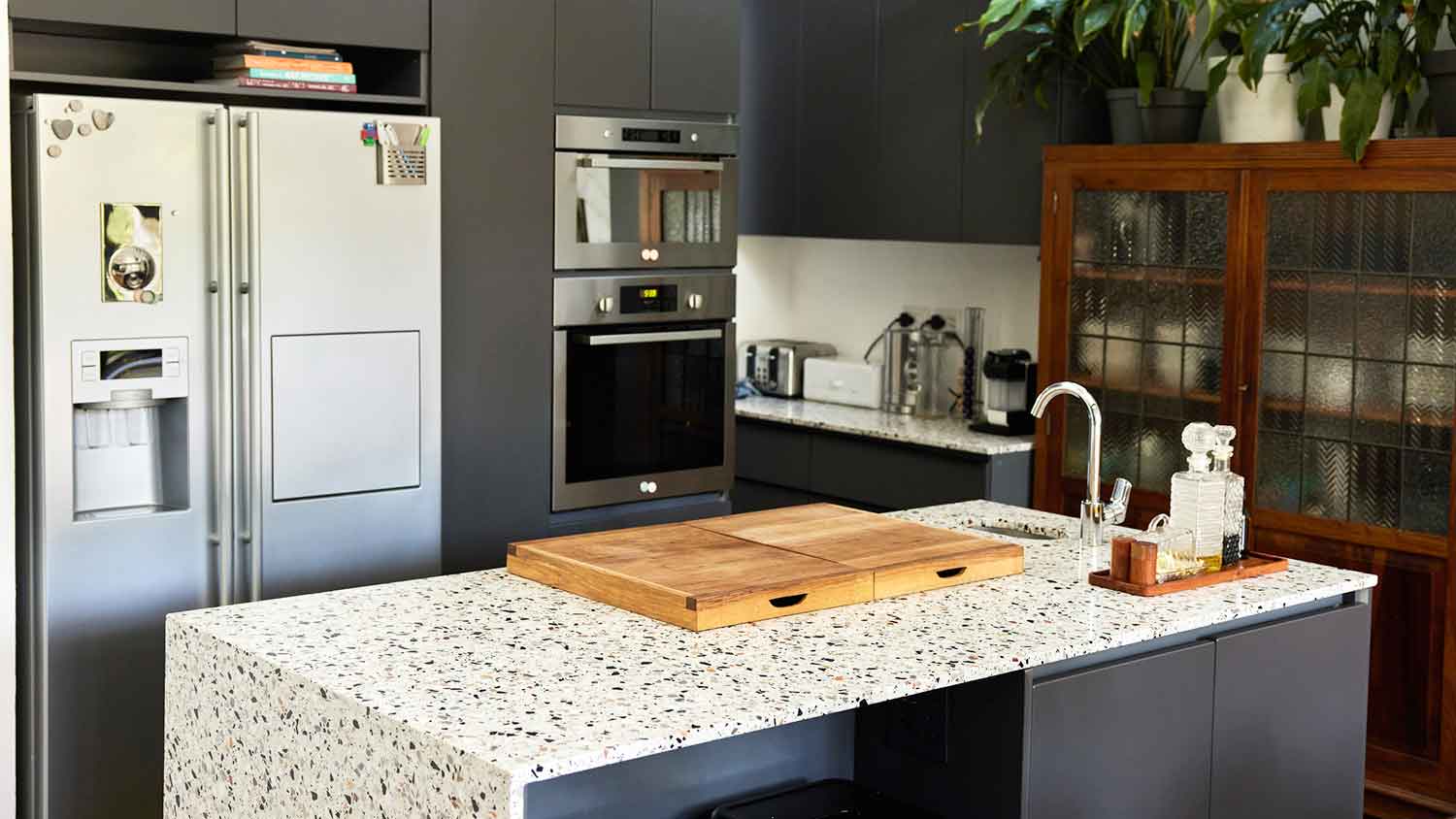
Kitchen islands are multipurpose workhorses in your kitchen. When looking to add one to your home, you should consider its size, materials, and its primary use in your home. Learn about the price of kitchen islands and their different features.
Choosing the right nonporous kitchen countertop can help reduce maintenance issues


Nonporous countertops are available in a variety of styles, feel, and budget.
Nonporous countertops are easy to keep clean since they don’t hold onto stains and spills.
Some nonporous countertops like stainless steel, recycled glass, and quartz are considered more environmentally friendly.
Laminate and solid surface countertops are the most budget-friendly of the nonporous countertop options.
Kitchens are one of the most active and frequently used rooms in a home so materials like the kitchen countertop need to be up to daily tasks. Nonporous kitchen countertops, like quartz, solid surface, or stainless steel, do not hold onto spills or stains, making them attractive for homeowners who want less cleanup or don’t want to worry about germs and dirt hiding in small crevices. Thanks to the different types of nonporous countertops available, there are choices in look, feel, and budget.
A nonporous surface is smooth, and nothing can penetrate it, including liquids, germs, or debris. This feature is attractive for kitchen countertops where a lot of food preparation takes place and requires frequent cleaning. There are no pores where liquids or other items can get trapped and linger.
Examples of popular nonporous surfaces include solid surface, stainless steel and quartz countertops. There are pros and cons to each nonporous surface to consider.
Nonporous countertops do not have pores or openings that allow liquids or other materials to penetrate a surface. Countertops are porous if water, other types of liquids, or debris can flow into the surface.
Another way to think about this is that a porous countertop or surface is like a sponge with tiny holes or pores. A sponge can hold onto liquid and dirt and over time, and if not cleaned properly, mold can grow. Porous countertops do have pores, so you will need to seal them if you plan to use them as a kitchen countertop where you cut vegetables and place glassware with condensation, wine glasses, or coffee mugs (which may spill and stain the surface). Otherwise, germs, bacteria, stains, and dirt can compromise the surface.
Since nonporous countertops are solid without any pores, they won’t absorb liquids and other elements like porous countertops. Unlike porous countertops, they don’t need to be sealed because they have a seal built into the material.
There are many types of countertop options available, both porous and nonporous. Natural stone kitchen countertops, including granite and marble, are porous, which is why they require sealing. Concrete countertop ideas are gaining popularity and are also porous.

Since nonporous materials are man-made, they are less expensive than natural stone, making these types of countertops popular for those seeking kitchen countertop ideas on a budget.
Solid surface countertops consist of approximately 33% binding resins and 66% minerals. They’re available in different styles, colors, and thickness levels and are among the least expensive of the nonporous countertops. Solid surface countertops are stain resistant, easy to clean, and solid throughout the entire piece. They don't handle heat well, use a trivet before placing any hot pans on the surface.
Laminate kitchen countertops are the most budget-friendly nonporous counters. They’ve come a long way since their introduction in the 1950s, and some designs mimic the look of natural stone. They’re often made using layers of paper covered with a protective melamine resin top layer. The laminate bonds to a solid material, such as plywood or particle board, and the materials are part of the reason for the cost savings.
These counters are easy to clean and resist staining, but some of the drawbacks are they’re not heat resistant, they’re susceptible to scratches, dents, and other damage, and can become dull-looking over time.
Quartz is an engineered countertop that consists of 90% to 94% quartz crystals mixed with 6% to 10% epoxy resin. It comes in a wide variety of colors and designs, some strikingly close to natural stone with veining similar to marble or colors similar to granite. Similar to natural stone, it can handle heat well. While it’s less expensive than natural stone, quartz tends to be more expensive than solid surface countertops.
Recycled glass countertops are made using glass shards crushed and reassembled into a pattern or mosaic within a cement or resin binding agent. Since this process reuses materials, some consider this an eco-friendly option.
While recycled glass countertops are considered nonporous and easy to clean and maintain since they’re mostly glass, the type of binding material matters when it comes to its porosity. If a cement-based binder is used, sealing the countertop regularly is advised. Like solid surface countertops, it doesn’t handle heat well, so a trivet or other form of protection from hot plates is necessary. Also, it’s more susceptible to cracks or chips because of the glass content.
Popular in professional kitchens and used by many chefs, stainless steel countertops are easy to clean and resist stains, heat, water and rust. They’re attractive for their modern appearance and being able to recycle this countertop at the end of its lifecycle is a bonus. They do tend to be on the pricey side compared to other nonporous kitchen countertops, but you can save a little money by going the pre-fabricated route. Expect to pay more for customization and upgrades.
Glazed lava stone is made from common lava stones, such as Obsidian, Pumice and Basalt, and features a glaze. It’s a highly durable material and can handle high levels of heat directly on its surface. Glazed lava stone is available in many color variations from bright blues to natural browns, and finish options include matte, satin, or a leather look. It’s a higher-end product, so expect to pay a premium for this nonporous kitchen countertop.

| Porous | Nonporous |
|---|---|
| Natural Stone | Man-made material |
| Needs sealing | Usually does not need sealing |
| More expensive | Budget-friendly |
During kitchen remodels, countertops and cabinets are among the most commonly updated features. Responses from 206,600 Angi customers show that 23.9% of homeowners requested countertops be moved or installed, while 22.8% requested the same for cabinets. Installing new countertops as part of a larger remodel can help create a cohesive design and allow homeowners to update multiple key elements simultaneously, thereby improving both the functionality and overall appearance of the kitchen.
Nonporous countertops are hard to beat for homeowners seeking an affordable, hassle-free kitchen countertop. Since nonporous are man-made, many options are less expensive than natural stone, making these countertops popular for those seeking kitchen countertop ideas on a budget.
The cost to install countertops is $3,200 on average, depending on several factors, including what’s most important to you. If you want a countertop that can withstand heat and you’re willing to spend a little more, opt for quartz, stainless steel, or glazed lava stone countertops. If budget is a concern and you don’t mind taking preventative measures such as using trivets, solid surface, laminate, and recycled glass countertops might be preferable.
Natural stone countertops vary greatly based on the type of stone and size, and while it’s possible to DIY some materials, this is where it might be best to hire a professional to make sure the job gets done right.
Depending on the type of nonporous kitchen countertop you plan to install and whether you have the materials at your disposal will determine whether you want to tackle the job as a DIY project. Or, leave it to the pros and hire a countertop installer near you.
Installing countertops is a job best left to the professionals, no matter if you plan on going with a nonporous or porous material. Pros must cut the slabs to fit the room, remove pre-existing fixtures, add sink cut-outs, and use high-grade adhesive to connect everything. It’s a time-consuming affair, and mistakes will cost you: Poorly installed countertops can lead to moisture issues and are prone to damage.
From average costs to expert advice, get all the answers you need to get your job done.

Kitchen islands are multipurpose workhorses in your kitchen. When looking to add one to your home, you should consider its size, materials, and its primary use in your home. Learn about the price of kitchen islands and their different features.

Countertop repair costs may be the deciding factor between replacing or repairing your counter. Let’s break down the cost to repair, resurface, or relaminate.

Butcher block countertops are a popular and durable choice for active kitchens. Learn how much it costs to install butcher block counters and what factors may affect pricing.

Laminate countertops are not heat resistant, so if you’ve left a burn mark, here’s how to fix a burnt countertop to make it look great again.

Solve scratched countertops in as little as a weekend with this DIY guide on how to resurface countertops. It’s so easy even beginners can do it.

Recycled glass countertops are made from discarded glass and a durable binding agent. Learn whether recycled glass countertops are the best choice for you.